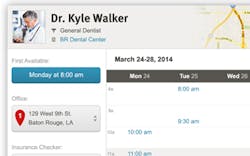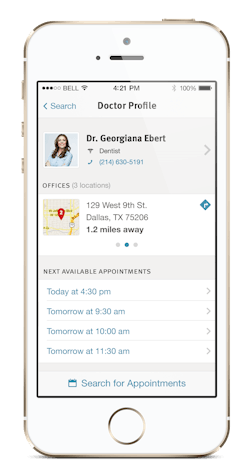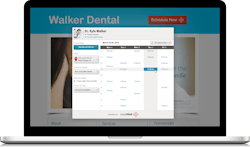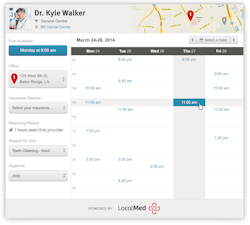Why the founder of a $36 million software company wants to schedule your next dental appointment
10 Questions with LocalMed CEO Keith English
But before we get to that . . . here's some background:
The idea for the innovative scheduling platform originated in 2011 with a group of Louisiana State University students working at the Louisiana Business and Technology Center’s Student Incubator. The idea piqued the interest of former Louisiana State Senator Marty Chabert and English, who eventually took on the role of visionary founder and CEO. Fast forward to 2014, when LocalMed formed a partnership with Blue Cross and Blue Shield of Louisiana. That same year, LocalMed formed a partnership with United Concordia. The insurance company, which works with approximately 98,000 dentists and 7 million members, offers LocalMed to providers and patients. The service isn’t available everywhere yet, but it’s growing (including twenty states and notable large cities, such as Los Angeles, Boston, and Chicago).
Here’s what English had to say about being an entrepreneur, getting LocalMed off the ground, and why the dental scheduling business caught his attention.
Q: You are a “start-up veteran.” Briefly describe your background. What does it take to be a successful entrepreneur, and where do many entrepreneurs fail?
KE: Most of the businesses I have operated and invested in are focused on finding ways to streamline the connections that allow customers to more efficiently locate and transact with businesses that wish to attract those customers. I have always felt that technological solutions can provide quicker and more efficient ways for businesses to be able to provide better services to their existing and potential customers. I hate calling businesses to do things that I can do on my own time, and I believe a large percentage of other people do too.
I think that being a successful entrepreneur is as much about good timing as it is about anything else. There are a ton of factors that make someone have the potential to succeed: willingness to work hard, ability to see things that others miss, ability to inspire others, ability to wear many hats, etc., but if the timing of their concept is not right, they will fail no matter how much of the other parts of the puzzle they possess. The best entrepreneurs that I have seen are very aware of what the market can take and is willing to grasp. This does not mean they do not build markets or develop for the future, it means they know to take one step forward at a time for what people will accept . . . not three giant leaps all at once.
Q: What set LocalMed apart as an idea worth investing in?
KE: When researching the concept that became LocalMed, I was struck by the lack of companies that were trying to address the issue that was being discussed. There was one larger company that was building in the space and a few smaller firms, but they are seemed to stop short of the logical conclusion. What we wanted to build, and since have built, exists in most other industries (when was the last time you booked a hotel or flight by calling the company?), but had not been developed in dental or healthcare in general. It was missing, and now I know why it was missing—it is very hard to do and takes a lot of stops and starts to get correct. I like tough concepts and making things work. Nothing is more fun than seeing something you have helped design and build get to a point that can be used effectively, where nothing existed before.
Q: The idea for LocalMed came from LSU students in 2011. Speaking generally, what financial agreement did you make with them when you agreed to become visionary founder and CEO of the company?
KE: The idea for the company was not fully formed when I became involved. It looks a lot different today than what we discussed originally. When I agreed to invest and run the company, I made an initial investment with another investor to give us enough capital to start fleshing out the concepts we want to develop.
Q: Describe the challenges and successes of bringing LocalMed to market. How long did it take? Was the idea easily “sell-able”? Did the tech development go as planned?
KE: We starting working in earnest around October of 2012 and launched to the open market in June of 2014, so about 20 months of development went into getting it live. As with all development projects there were changes that had to be made from our original plans and things, we learned along the way. That led us to where we are today. Even today we learn new things all the time that help us to make our platform a better product for our customers. Where we are right now is a good spot for us, but we have many further plans to continue to bring new products to the market that we are in a unique position to provide.
Q: Describe the LocalMed team. Who are the key team members, and what strengths do they bring to the company?
KE: We have been able to put together a great team of people. Our development team is headed by Jeremy Switzer and Peter Browne, and they have surrounded themselves with a cohesive team of high quality engineers. The combination of the skills they possess lets us tackle everything from high level concepts to the most arcane coding. If you have ever worked with a dental practice management system, you understand why the latter ability is important. Jacob Henderson heads up our operations, and I am confident in saying that Jacob knows more about the backend of how scheduling functions in a PMS than any person I know. Within a minute or two of looking, he can tell exactly how we can work with a practice and see how to utilize our platform most effectively. We spent countless hours in dental offices seeing the different methods of scheduling and Jacob can translate them very effectively.
Q: What does the future of dental scheduling look like, and how is LocalMed pursuing that? (For example, what are consumer expectations? What are dental practice’s needs? What do dental practices not do well that they need help with?)
KE: Dental scheduling is its own unique monster. It is like a jigsaw puzzle at most offices—a 15 minute appointment followed by a 60 minute appointment, followed by a 30 minute appointment, etc., and across multiple chairs. However the office lines up their scheduling, ultimately the goal is to maximize the dentist’s chair time at the highest potential billing opportunities to ensure the best per hour production. At its base level this starts with filling up chairs, which starts with giving patients the most convenient way to schedule. Most people will find excuses to not go to the dentist, and only allowing patients to schedule by calling an office during business hours is not convenient for patients at all. Providing patients with scheduling options that are convenient for them increases the probability of them selecting to visit the dentist.
Consumers expect convenience. Most other businesses have worked very hard to address this as related to scheduling. Healthcare and dental are the last holdouts. According to PEW research, 81% of patients have said they would rather schedule their appointments online and 68% of people have said they would actually switch providers for better online access. Those offices that embrace these concepts will see significant gains, those that don’t will wonder why their business is not more successful. We have already seen this effect in several markets where we have a number of providers. One of our providers asked us to pause their service while they made some changes to their PMS. The office manager called 5 days later begging to turn it back on because their numbers were suffering and chairs were not being filled. We do not market for them at all, this was simply due to the fact that the easiest way for consumers to schedule had been removed from their website for just a few days.
Many dental practices are resistant to any change, but like any other consumer-facing business, they must adapt or watch others succeed while they stay still or go backwards. The practices that recognize this concept in general grasp what we are doing and adopt it very quickly and gladly. Many other practices want to do things as they always have. Fortunately for us, we are attracting more and more of those that want to provide more conveniences for their patients that consequently more business for themselves.
Q: From the perspective of the dentist (or any other group who uses the software), what is the ROI for LocalMed?
KE: Most offices see ROI well over 5 times our fee and quite a few over 10 times. I priced our service low to foster widespread adoption, not to make money off a small number of providers. With the upcoming release of our call center connection software, these numbers will increase drastically.
Q: Has LocalMed succeeded financially, or are you still getting things off the ground?
KE: We are in-line with expectations financially. We have been in discussions with several groups that are interested in investing and that is a possibility as we look to expand.
Q: LocalMed has plans to expand its geographical reach and its offerings. Could you generally describe your plans for future growth—areas you’re avoiding and areas you see opportunity in?
KE: We are looking to expand within the US right now, and are working to build out our contacts and sales force to facilitate this growth. We are also beginning work on our connections to the orthodontic systems that are market leaders and have several interesting products that will be available once we get those connections complete. In addition, we are exploring options with our insurance partners on how to most effectively link providers, patients and insurance companies during the scheduling process to remove coverage questions. We see great potential in these areas and things that we feel we are in a good position to be able to address.
Q: What do you want people to know about LocalMed that they don’t already know? (Misconceptions, successes, etc.)
KE: Some offices we call on automatically think, “Our scheduling is way too complex, they will never understand or be able to get it right.” Our system was built specifically for dental scheduling, it was not designed for another industry and then made to fit dental, therefore we can handle most situations. As a general rule, if the person in charge of scheduling can be told a rule, our system can be told that same rule and handle it properly. Once we get a chance to show an office all the filters and options we have built into the system to allow an office to customize our platform to their needs, it becomes clear that it can work for them.
* * *
Zachary Kulsrud is senior editor for PennWell's dental group, which includes Apex360,Dental Economics, and DentistryIQ. Have a story idea or comment? Email him at [email protected] or connect on LinkedIn.
Editor's note: This article first appeared in the Apex360newsletter. Subscribe here.
About the Author
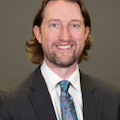
Zachary Kulsrud
Zachary Kulsrud is the editorial director for Endeavor Business Media's dental group, publishers of Dental Economics, DentistryIQ, Perio-Implant Advisory, and RDH magazine.
Updated July 7, 2020
